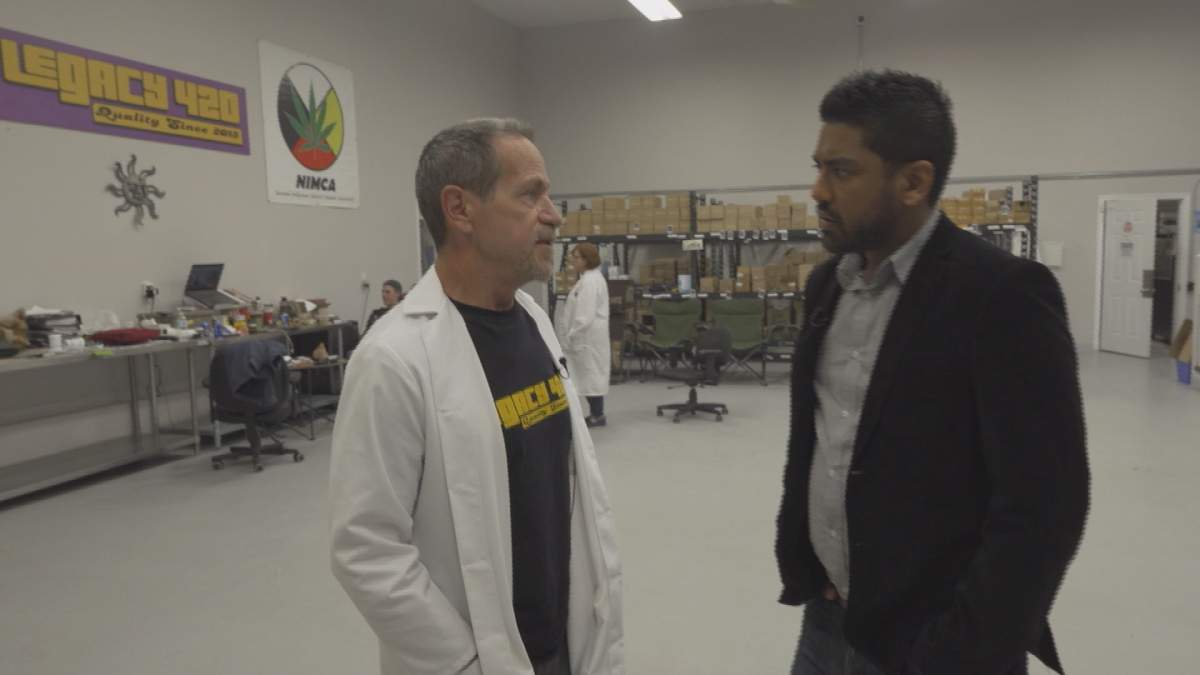The signs are clear when you enter Tyendinaga First Nation: this is cannabis central.

The drive into the small community of about 4,000 is spotted with billboards advertising cannabis products, accessories and dispensaries. There are over 50 dispensaries in the community. That’s a pot shop for every 80 people or so.
Tim Barnhart, a medical marijuana producer, owns Legacy 420. The dispensary, Barnhart says, is the largest in the province and the products are wide-ranging.
When you first enter, shelves and glass cases are stocked with edibles, including teas, juice crystals, Nanaimo bars, gummies and lollipops. There is also an abundance of plant product.
Barnhart says first-time customers are overwhelmed.
“They are flabbergasted. They’re in awe, so they walk in and they say, ‘Oh my God.’ They generally say, ‘It’s about time,’ or ‘I thought I’d never see this.’”
MORE: For the launch of our weekly newsletter Cannabis IQ, we’re giving away $100 Visa gift cards. Click here to find out more.
Barnhart says indigenous communities in have a rich history and intimate relationship with the plant. He does not want to see government control of production.

Get weekly health news
Barnhart is president of The National Indigenous Medical Cannabis Association, or NIMCA, a non-profit established in 2017 to defend the rights of Indigenous people involved in the cannabis industry. It’s an organization says Barnhart that can provide a template for self-regulation.
In an interview with Global News, Ontario’s Attorney General Caroline Mulroney said that unlicensed dispensaries and production facilities are illegal. “The only legal seller of recreational marijuana in the province of Ontario will be the OCS on October 17th.”
“There are over 100 different communities,” she says. “We’ve had meetings with representatives of Indigenous communities and we are working with the Ministry of Finance, the Minister of Indigenous Affairs as well, to make sure that we are responding to their individual communities’ concerns.”
Under provincial legislation, the Alcohol and Gaming Commission of Ontario will handle private retail licenses.
“Any store located within a First Nations reserve would require approval by the communities’ Chief and Council by way of a band council resolution before the AGCO issues a retail store authorization,” Mulroney’s office said in a statement.
Toronto cannabis lawyer Jack Lloyd has concerns. “It’s a complete grey area and it’s uncertain how it’s going to be regulated in their territories. It’s part of a broader argument about self-government and self-determination for those communities.”
Lloyd says a legal battle is brewing and that he’s hearing from Indigenous communities that are ready for the fight.
“I would argue they have an economic right to interact with the cannabis plant. I think that is a profound argument. It is certainly very connected with arguments about self-governance, and I think that Ottawa and Ontario need to be cognizant of that and recognize what’s happening there and see it as a good thing.”

_848x480_1346723395545.jpg?w=1040&quality=70&strip=all)








Comments
Want to discuss? Please read our Commenting Policy first.